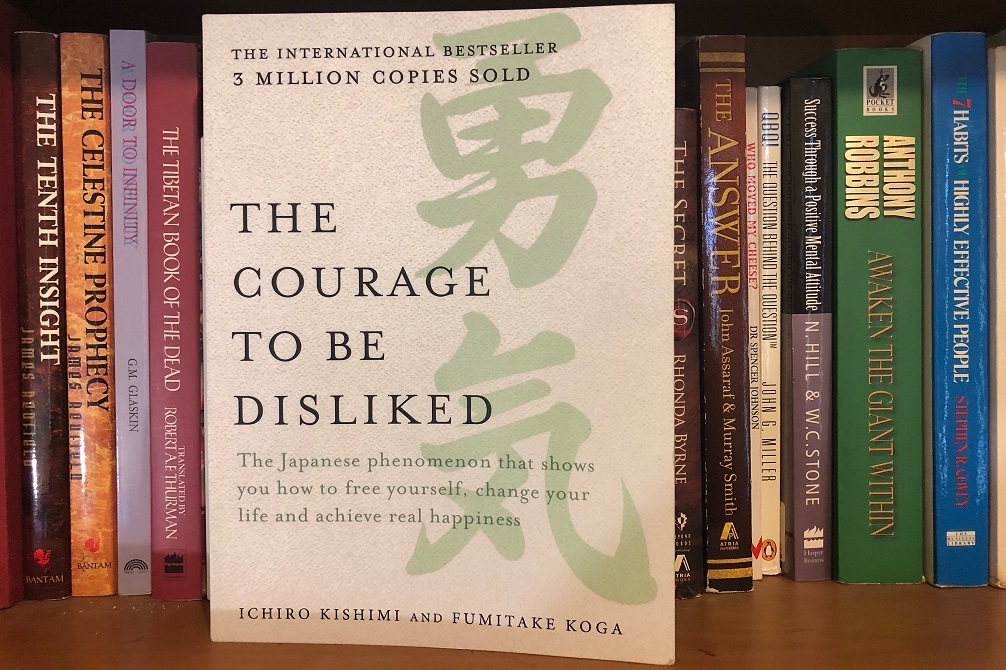The Courage To Be Disliked
By: Ichiro Kishimi and Fumitake Koga

Quote: “You are not living to satisfy other people’s expectations, and neither am I.”
“The Courage To Be Disliked” is the first book that I have read cover to cover for many years. (Read my reading list introduction to discover why!)
I discovered the book while searching on Fishpond for another book that had been recommended to me. I wasn’t intending to buy another book at the time, but the title caught my attention, particularly as it appeared right around the time I was writing a blog post about my biggest fear. I purchased both books, and as luck would have it, “The Courage To Be Disliked” arrived first.
The book is written in the form of a conversation between a philosopher and a “youth” in a similar style as the book “Conversations With God”. I found the language used in the book quite easy to read, with only a few ‘big words’ sprinkled here and there throughout the story. Written by two Japanese gentlemen, Ichiro Kishimi and Fumitake Koga, I have the impression that they probably played the roles of the philosopher and the youth. The book is translated from Japanese into English, and that may affect a slight impersonal feeling that I had from the book.
“The Courage To Be Disliked” follows a series of conversations between the philosopher and the youth that centres around the teachings of a 19th century psychologist named Alfred Adler. He had a completely different take on psychology at that time to more eminent phycologists like Sigmund Freud and Carl Jung, and while this book does not directly challenge the theories of Freud and Jung, it specifically highlights the beliefs of Adler.
While I was reading the book, I had to overcome my own perception of the two characters in the book. To me, the philosopher took on the persona of an age old sage rather than a philosopher, bestowing is many years of wisdom on the youth, blurring the lines between psychology and philosophy.
On the other hand I found the character of the youth to be quite antagonistic, almost to the point of insolence. Although I do understand his role in the book, I didn’t like his character too much. He is playing devil’s advocate, extracting the teachings from the sage. Interestingly though, he is also expressing many of my own opinions.
From the title of the book, I guess I was expecting an instructional self help book, something that would give me step by step instructions about how to overcome my fear of being disliked. Something that would be concrete and final, a call to action. I soon discovered that this is not that book, and therefore, whilst I was reading the book, I only really rated it about a two and a half out of five.
I had based that on my own expectations, which is an ironic statement given my chosen quote from the book! In a book store I usually read a few pages before buying a book. Purchasing on the internet, you don’t have the opportunity or the luxury to flick through the pages first. If I had, there is a chance I may not have bought it.
However, having read the book cover to cover, including the authors’ afterword and removing my unfounded expectations of the book I thought it was and seeing it for what it really is, I believe it deserves at least a three and a half, and I am grateful that I purchased and read it.
My perception of this book now is that it is not a step by step instructional manual. It is a book of reflection. It is a book from which I can accept (or reject) the Adlerian teachings of the philosopher, think about them deeply and meditate on them, really give them space to grow and breath within my being.
In the first instance, I suggest reading the book from cover to cover. On my first read through, I didn’t internalise the concepts proposed in the book so I will read it again, but this time not cover to cover. Instead I will pick sections of the book, probably at random, meditating and reflecting on it’s teachings. Then, maybe I will free myself, change my life and achieve real happiness, as it claims on the cover.
My Rating : ![]()
Purchase: “The Courage To Be Disliked.”
